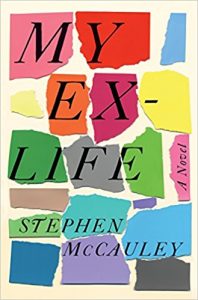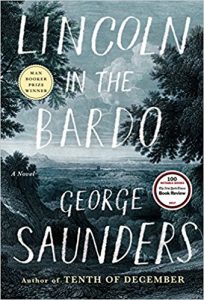I made the mistake of reading other books before reviewing these, so already they fade in my memory.
My Ex-Life, by Stephen McCauley
The plot of this book is exactly my kind of thing: David, a gay man whose life is in a bit of upheaval, goes to stay with his ex-wife Julie and her daughter Mandy for a little while to help them with some stuff, and things go really nicely and companionably and appealingly. But the book was written in a style I don’t like: the author almost couldn’t write a sentence without making a snarky/clever/witty add-on:
David guessed him to be in his late thirties or early forties, but boyishness still clung to him, as it often does to men with good hair or unresolved relationships with their fathers. He was tidily dressed in short pants and a green polo shirt, and he wore around his neck a lanyard with a heavy set of keys attached, a little like a gym teacher or an obstreperous camp counselor.
I found it extremely tiring to read in fiction, because there is no way to get absorbed in the story if the author is constantly drawing your attention to the way he’s writing it. It was like getting constantly nudged.
Also, it was the kind of book that confirms your fears that everyone is thinking mean things about everyone else:
Carol had a high, girlish voice. She took superb care of herself–her skin appeared to be polished–but she had the hard face of someone who could stand to eat a cupcake once or twice a year. The bones were too prominent, and the muscles around her jaw flexed visibly when she spoke. As was to be expected, she was pretty. But it was the flat prettiness of a sorority sister who wears pastels, subscribes to Self magazine, and actually reads the articles. She punctuated her comments with a dry, nervous laugh that reminded David of the panting of a dog eager to be petted.
and:
If Carol was making an exhausting effort to please, Henry was aiming for a stern demeanor that gave away nothing. David had noted this deportment in strong-willed men overcompensating for the fact that their lives are controlled by their wives or girlfriends. He had a dark suntan, an attractive affectation, but one that these days looked somehow vintage, like a dial telephone or an electric carving knife.
It’s vivid, creative, descriptive writing, but I didn’t like it and it made me feel yucky to read it. Despite that, I read to the end because I wanted to know what would happen with the plot, which I liked very much. And because of charming passages like this one, where David and Mandy walk Mandy’s dog deliberately past a shop where the shopkeeper always comes out with a dog biscuit:
After a few minutes, a small man emerged holding something in his hands. “Please don’t pretend you’re not expecting a snack,” he said. “We’re beyond that charade.”
The author then interjects to say it wasn’t clear if he was speaking to Mandy or to the dog, but it is 100% endearing if he’s talking to the dog, and otherwise it is not, so I wish he had just let us assume it was addressed to the dog (which it absolutely was, and you cannot tell me otherwise).
It is hard to say if I recommend the book or not. I guess I do, especially since people have different tastes in writing styles and you might LOVE what I found tiring/depressing.
Lincoln in the Bardo, by George Saunders
I read this after reading Shelf Love’s review, which I highly recommend you read as well, because it explains it very well with the appropriate warnings. Even with the warnings, I spent the first 50 pages or so thinking the book might be too experimental/confusing for me to get through (and sighing at the body-part crudity and bathroom crudity). But sometime after that, I went from uncertain to enchanted, and spent the rest of the book thinking things such as “Why are there not MORE books like this??” and getting bowled over by new plot points. (And skimming some of the chapters full of quotes from Lincoln resources. They were good, and they contributed to the story, but there were TOO MANY BY HALF.) I really, really liked it, and added several more books by this author to my library list.



Hi! I’m a regular reader here, but a rare commenter. I love, love, love George Saunders and I was a little trepidatious to learn your thoughts. If you had panned Lincoln in the Bardo I’d have been disappointed and surprised to the point that I’d think maybe I didn’t really know Swistle after all these (9!) years. One of the things that I love about Saunders is his compassion for humanity and our general and individual failings, while still making clever observations and poking fun. The other thing about Bardo that has really stuck in the year since I read it was the portrait he created of Lincoln. It gave me pangs to think of how decent and kind he was as a person and as a president. I wonder how he’d be received today.
This is exactly the way I felt: Afraid Swistle wouldn’t like the book I loved so much, and so very, very sorrowful for the life Lincoln lived.
Just from the excerpts of My Ex-Life that you posted, I guessed that this book was written by a man, and then I scrolled back up to confirm. It’s weird, from those couple of passages I got a sense of (1) the show-offy writer who keeps nudging you with how clever he is (which I agree with you is extremely tiresome); and (2) at least a mild case of misogyny (women are trying too hard to be pretty, but not succeeding, and they are controlling).
Also it sounds extremely exhausting, like spending time with a man who was never told no by his mother or who thinks too highly of his own ability to accessorize.
:P
I loved The Object of My Affection (which he also wrote) and am really disappointed that this book is not going to measure up. Blergh.
Oh my heavens, I LOVED Object of My Affection…my then bf (now husband of 28 years) and I read bits aloud to each other on a train trip in Europe. I had read several Steven McCauley novels since and was so excited that a new one had come out. This one is meh. I actually do like the snarky asides though.
I was exhausted just reading those passages. Agree with LeighTX!
I listened to Lincoln in the Bardo. It was fabulous! Instead of a single narrator they used more than 100 people, including David Sedaris, Megan Mullalley and others. I found it mesmerizing and it made the historical notes easy to get through. Highly recommended.
I love George Saunders so very much. If I might suggest Civilwarland in Bad Decline for your next foray? It’s so imaginative and weird and I love it so.
Lincoln in the Bardo is on my nightstand and my husband and I tried to listen to it during a car trip… and, while the narration was excellent (Nick Offerman makes me giggle with every utterance), it was SO CONFUSING. So I think I really have to READ it. And then maybe listen to it.
I am very glad you included those passages from My Ex-Life because that style of writing annoys me tremendously. I will be skipping that book thankyouverymuch.
I just requested Ex-Life from the library last week, and apparently glazed over the author’s name and gender.
My husband and I recently separated, and I am in no mood for look-at-me-style writing at the moment or opposite-gender writers. Thank you for the review/warning, I will give it a few chapters of a chance, but may return it quickly.
I’m really glad you liked Bardo. It’s my book club selection for August and one of my friends told me it was too confusing! But we will persevere. :)
Love George Sunders so deeply, so glad you liked Lincoln in the Bardo because it is experimental and kinda confusing but ultimately so so moving.
I loved, loved, loved Lincoln in the Bardo. Some of the historical footnotes are real, but many of them are invented by Saunders himself. As an English professor, I really dug that too – what counts as accurate? How do we know what is real? What are our criteria for credibility? What are the lines between fiction and nonfiction, between truth and memory?
I liked how the constructed/fabricated sources were a designed to be a deliberate part of the narrative.
From the reviews I had seen I was concerned that LitB might be too heady and morose for me. But I am encouraged. I haven’t ever read any Saunders and think I will start with Civilwarland in Bad Decline. He spoke at the local univ. campus and the student paper did a write up. I cut out this quote and have it on my wall at work because it’s lovely:
“A novel is a little machine, hopefully to thrill you and me. It’s a machine that’s a dramatic contrivance, and its job is to be beautiful by any means necessary.”
Fiction is good stuff.